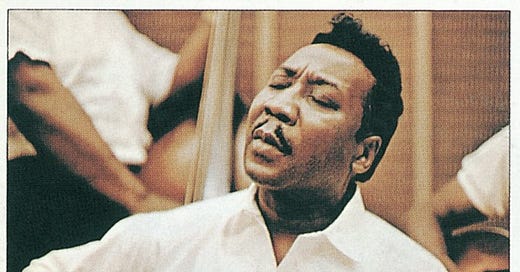Muddy Waters and Buddy Guy: The Chess Records “Folk Singer” Album
The Backstory of the 1964 Acoustic Blues Masterpiece
The 1964 Chess Records album Folk Singer is probably as close as you’ll ever come to experiencing what it would sound like to have Muddy Waters singing and playing acoustic guitar in your living room. His deep, resonant voice, slashing slide guitar, and song choices take listeners back in time to his journeyman days in the Mississippi Delta. Joining him on parts of this all-acoustic release are Buddy Guy on second guitar, Willie Dixon on upright bass, and Clifton James on drums. Ironically, the two-hour session that produced this landmark LP almost ended before it began, largely due to the stubbornness of label owner Leonard Chess. Luckily, Muddy Waters stood his ground and prevailed.
First, some background: About six weeks before the Folk Singer session, on July 26, 1963, all of the musicians playing on the album had recorded at the Copa Cabana Club on Chicago’s West Side. Among the five songs Muddy and Buddy collaborated on were the Waters-fronted “Got My Mojo Working” and “19 Years Old”; these were anthologized on Chess’ Blues From Big Bill’s Copa Cabana and Argo’s Folk Festival of the Blues. Buddy Guy also recorded as a leader that evening, with Clifton James playing drums on the released tracks “Buddy’s Boogie” and “Worried Blues (Stick Around)”. By then, Clifton James had long been a mainstay of Bo Diddley’s studio band.
Buddy Guy’s relationships with Willie Dixon and Muddy Waters dated back to his arrival in Chicago six years earlier. Working for Cobra Records founder Eli Toscano, Dixon had arranged the sessions and played bass on Guy’s first two released singles, 1958’s “Sit and Cry (The Blues)” b/w “Try to Quit You Baby” and “You Sure Can’t Do”/“This Is the End,” both issued on the Artistic label.
Growing up in rural Louisiana, Buddy had idolized Muddy Waters and dreamed of one day backing him onstage. He was taken aback when, during one of their first meetings, Muddy gave him an unexpected wake-up call. As Buddy tells it, “Muddy had heard about me because I’d played a set or two with a horn player by the name of Rufus Foreman, and Magic Sam had seen me play. And the word was just getting around: ‘This little black guy from Louisiana can play, man. He’s playing these Muddy Waters tunes.’ Naturally, that’s what I was playing – B.B. or Muddy or Jimmy Reed. It just caught on, and they took me in like a kid.
“I was very shy when I started. I wouldn’t sing, but I would play if you’d corner me off, and I’d play well. And Muddy went out there one night [at the 708 Club] and said, ‘Gee, that guy can play,’ but when he called me out of the room, I just shied back in the corner and said, ‘Pay him no mind, man. He’s just talking like that.’ And he just turned around and slapped me, man! And it was hard enough for me to say, ‘Why are you doing that?’ He said, ‘I don’t want to hear that from you. You gonna play.’ After that he just took over like a daddy to me, man.
Keep reading with a 7-day free trial
Subscribe to Talking Guitar ★ Jas Obrecht's Music Magazine to keep reading this post and get 7 days of free access to the full post archives.



